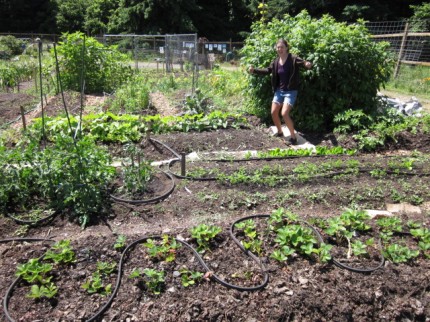I got so engaged in my armageddonesque eco-talk that I forgot to explain my project.
Vijay asked me, “how often do you want to go? 2-3 times a week?” I had been thinking maybe once a week, but okay sure! I’m happier and healthier when I stay busy, so I think it will be good for me. As of now I pretty much at the beach office all the time. It’s beautiful here, but I would more than welcome a chance to balance that time with meaningful excursions to the farm.
Vijay said that the Sri Aurobindo Society would like to start documenting the work of the organic farm, and would I like to help with that? Umm, YES! I’ll be developing content that will become a booklet and go on the website. I might revamp the current training they have too. The goal is to go over the specific techniques used, but to also convey the systems of natural farming. At the Sri Aurobindo Society, agriculture is spiritual. How cool is that?
Farm coordinator Bhavuram = documentation averse
“Natural farming” is the new term used to define holistic farming practices, where all inputs matter. Organic farming connotes a response to inorganic farming. Natural farming stands alone. It asks where does the water and fertilizer come from? I believe it is similar to the values of permaculture.
Here the farm stores rainwater, mixing it with cow dung and urine to make a super-powered mixture for the crops. All inputs come from the farm itself.
Food gardens are very important to me. When I took the Urban Farm class at UO, it was by far my favorite class. Whenever people from out of town visited, I always took them to see the beautiful two-acre farm, tucked behind the major thoroughfare by campus. Come to think of it, I took unacquainted UO students too. When I lived at the Campbell Club I loved helping out at our lovely community garden plot by the river.
My lovely friend Grace, with the Campbell Club tomatoes and strawberries
I have always been fascinated by the plant life cycle. Growth, pollination, fruiting, consumption, then the passing of food that returns to the soil to fertilize the next generation. What is a more beautifully perfect system than that? Just like humans have a desire to sacrifice and serve others, plants also have an innate wish to give their produce.
The Mother writes about this. When she was in her garden she would never know witch flower to pluck, not wanting to cause harm to some while sparing the others. She sat and concentrated for a bit and started to hear which flowers were calling to be plucked. She went to the vegetable garden and the same thing happened. Some would say “no, no no”, and then a vegetable would call to her, “pick me! I am ready!” Animals do the same. When a cheetah catches a zebra, it struggles for a bit, but there is a moment when it knows it cannot escape and it relaxes and gives itself to the cheetah, to the cycle of the natural world.
Yesterday I had a revelation that food gardens are my sacred places. They have such pure intentions. When I go into temples or cathedrals, I appreciate the fine architecture but I do not feel anything deep inside that connects me to the walls or high ceilings. In a garden, I feel calm yet vibrant, alive and connected. Barefoot as much as possible.
On top of being a meaningful project for the society, I think the garden has many truths to teach me.



I was reading more of Michael Pollen’s “Omnivore’s Dilemma” out on the blow-up boat at Lost Lake. He describes a farm where everything is feeding everything else. The owner does not buy much! You can see why our capitalistic society does not encourage that. It’s so great to hear examples of what is working and the love those people feel for doing things in harmony with the Earth. You are right that people are motivated by love, not fear.
I have only read the beginning of Omnivore’s Dilemma, but I will try and find a copy here. I’d like to finish it and I think it would be useful to my research too! Check my facebook for a posted NYT article about using vegetable scraps in creative ways.
Ok, so you can guess what I am going to ask…Natural farming, so are there bees?